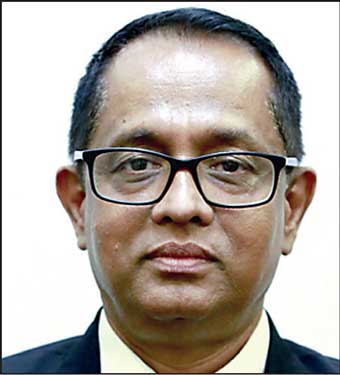Thursday Feb 19, 2026
Thursday Feb 19, 2026
Friday, 26 September 2025 00:02 - - {{hitsCtrl.values.hits}}
 |
| Speaker of Parliament Dr. Jagath Wickramaratne |
The Samagi Jana Balawegaya (SJB) has announced plans to table a no-confidence motion against Speaker of Parliament Dr. Jagath Wickramaratne, citing his recent conduct in presiding over Parliamentary proceedings.
Addressing the House, SJB legislator Ajith P. Perera charged that the Speaker had dismissed a previously submitted motion of no confidence without giving reasons. He argued that such actions weaken democratic safeguards and diminish the principle of accountability within Parliament.
However, responding to the Opposition’s criticism, Speaker Dr. Wickramaratne yesterday defended his decision to reject the no-confidence motion brought last month against Deputy Defence Minister Major General (Retd.) Aruna Jayasekera.
The Speaker cited Standing Order 76(1), which vests in him the responsibility for maintaining Parliamentary rules of order, noting that his rulings cannot be appealed except through a substantive motion made after due notice. He argued that both the Constitution and the Standing Orders are silent on the procedure for moving a no-confidence motion against individual Cabinet or Deputy Ministers.
The only express provision, he pointed out, is Article 49(2) of the Constitution, which provides for a no-confidence motion against the Government as a whole.
While acknowledging that motions have previously been brought against Prime Ministers and individual Ministers despite this silence, the Speaker questioned the legal basis of such precedents. He observed that in the Sri Lankan context, no-confidence motions can be more appropriately brought against Parliamentary office-bearers such as the Speaker, Deputy Speaker, Leader of the House, or the Leader of the Opposition.
Drawing on international practice, he noted that no-confidence motions are generally permitted only against governments or councils of ministers as a whole, citing parliamentary procedure texts including Erskine May and Practice and Procedure of Parliament by Kaul and Shakdher.
He further explained that under Articles 42 to 44 of the Constitution, ministerial responsibility is collective, and that Deputy Ministers, appointed under Article 46(1), do not hold independent powers unless specifically delegated by Cabinet Ministers.
“In view of these provisions, I ruled the motion out of order under Standing Order 27(3),” Dr. Wickramaratne said. However, he suggested that members consider submitting a substantive motion instead, especially given the national importance of the matters raised in relation to the Easter Sunday attacks.
He also noted that the Attorney General had opined that the specific facts cited in the motion did not directly affect pending Court proceedings.